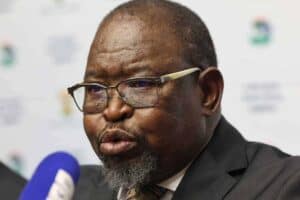Lowering the fuel price as the minister of mineral resources and energy wants to do does not simply entail scrapping two fuel levies.

Government should act and speak less when it comes to cutting fuel levies, but on the other hand, how will government replace that revenue if it does get around to doing that?
Minister of Mineral Resources and Energy, Gwede Mantashe, said at the Africa Oil Week on Wednesday that government is actively discussing ways to reduce fuel costs, including potentially lowering the fuel levy and the Road Accident Fund (RAF) levy. He said petrol should cost R14 per litre.
However, Wayne Duvenage, CEO of Outa, does not believe he is serious. “The South African public has been listening to politicians talk about removing the tax components to lower the price of petrol for many years now, but nothing has really come from these not-so-bright suggestions.
“The only relief the public has seen was a brief reduction in the General Fuel Levy in 2022 when the Russia-Ukraine war pushed up the international oil price, which sent the Basic Fuel Price (BFP) component of our petrol price soaring.”
ALSO READ: Early petrol price predictions for November come with a warning
Petrol price of R14 per litre if fuel levies are scrapped
He says it is all very well to speak of a petrol price of R14 per litre but that would require the minister of finance to remove the General Fuel Levy which is currently R3.85 and the Road Accident Fund (RAF) Levy, which is now R2.18 per litre.
“Our reality is that we have watched our petrol price fluctuate at the mercy of two main components: the international oil price which is subjected to geopolitical forces and our rand currency exchange rate, which is influenced by our own political conduct and economic conditions.”
Duvenage points out that there is, of course, the issue of a further R5.16 per litre in the petrol price, which is made up of ten other components that largely cover the costs of storage, transport and margins for the retailers and wholesalers of petrol.
“However, as hard as they have tried in the past, the authorities have been unable to reduce these minor levies and only managed to contain them as best they can. Fortunately, soon after Enoch Godongwana became the minister of finance, he realised the damaging impact of incessant increases to the General Fuel Levy and RAF Levy over the past two decades and stopped these increases in 2022. Had he not done so, our petrol price would be around R1 more per litre today.”
ALSO READ: Less petrol pain? Calls for fuel pricing review committee intensify
Fuel price fluctuates due to international oil price
This graph shows how the basic fuel price component, which makes up around half (48%) of the total price of petrol over the past decade, has fluctuated largely due to changing oil prices:

Duvenage explains that during the year of 2020/21, when demand dropped during the height of the Covid-19 pandemic, the average price of Brent Crude oil was around $41 per barrel. “This in turn reduced our petrol price from an average of R16.16 the year before to R14.65 per litre, despite the rand/dollar exchange rate of R16.49 /$1 on average, which was 13% up on the year before.
“This gives a clear indication of the power of international geo-political forces on our petrol price.”
He says the graph also shows how the international oil price escalations that began in 2021/22, taking Brent Crude from $65 to $96 per barrel (average of $76.38 for that year), pushed our petrol price over R20 per litre and have kept our petrol prices fluctuating on yearly average above the R23 per litre mark since then.
“The recent few months’ reduction in the price of petrol from a high of R25.49 in May this year to R21.05 in October was largely thanks to a combined strengthening of the rand (by 6.5%) and the lower oil price (down by 17%), which reduced the basic fuel price component of our petrol price to below R10 per litre for the first time since February 2022.”
ALSO READ: Downhill until Christmas? Three-year low in petrol and diesel prices expected for October
Watch out for Middle East tensions pushing up fuel prices
However, Duvenage warns that current tensions in the Middle East between Iran and Israel could very well reverse these gains and our petrol price could escalate back up to R23/R24 per litre levels in a short space of time.
“Should government take meaningful action to remove the two biggest levies and tax components, the General Fuel Levy and the RAF Levy, it would have a marked impact on reducing the price of petrol and diesel by around R6 per litre.
“However, government would need to increase the rate of taxes in one or more areas of VAT and personal income tax to make up for the R130 billion to R140 billion lost to Treasury per year as a result of this decision.”
Duvenage says given our current state of affairs, the only other way government could manage such a drastic reduction in taxation would be to remove the wasteful expenditure caused by maladministration and corruption throughout all levels of government, combined with trimming the fat of a bloated administration. “This is hardly likely to happen in the next few years.”






